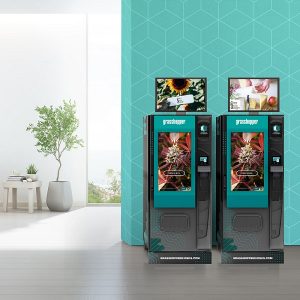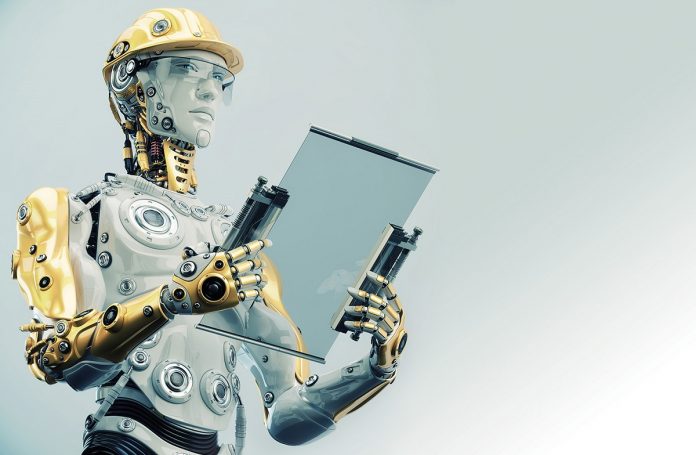First Law: A robot may not injure a human being or, through inaction, allow a human being to come to harm.
Second Law: A robot must obey the orders given it by human beings except where such orders would conflict with the First Law.
Third Law: A robot must protect its own existence as long as such protection does not conflict with the First or Second Laws.
—Isaac Asimov’s Three Laws of Robotics
As foot traffic in dispensaries increases, shop owners are looking for innovative ways to streamline the shopping experience. In today’s consumer-driven climate, digital solutions like self-service kiosks are gaining popularity. Although retail vending machines are nothing new, the cannabis industry is just beginning to take them seriously, thanks in large part to improvements in reliability and capabilities over the past twelve months. In fact, not only has there been an uptick in established kiosk companies entering the space during the past year, but the specialization, customization, and high-tech software in artificially intelligent retail sales assistants have become increasingly impressive.
In other words, robotics has come to cannabis and cannabis is embracing the invasion.
That’s not a bad thing. A study by software-as-a-service platform InReality found self-service kiosks can reduce customer wait times by up to 50 percent and increase average order size by 25 percent. “By utilizing self-service options in dispensaries, businesses are streamlining customer check-in and queuing, enhancing the product selection experience, and improving efficiencies in store operations,” said William Butler, former chief executive officer for KIOSK.
KIOSK has been manufacturing vending machines since 1993. According to Butler, the self-service stations are much more than just transaction assistants. They also can enhance customer loyalty, provide dispensary owners with automated data collection, and reward repeat customers. “By combining these endless-aisle product selection kiosks, digital queuing displays, check-in and loyalty transaction automation, and innovative product delivery technologies, dispensaries are curating an automation ecosystem to improve the customer experience while optimizing store efficiencies and profitability,” he said.
“The kiosk solutions are unique, as they’re flexible and can expand as customers grow,” he continued, citing, among other things, remote management via an internet-of-things platform that allows the systems to detect performance status and alert staff to problems in real-time.

Retail matchmaking
Tracking, data analysis, and management capabilities make kiosks very attractive. The question is: With so much new equipment entering the marketplace, how can retailers determine whether a kiosk will benefit their operation? If the answer is yes, which technology best meets their needs?
First and foremost, shops that frequently experience significant wait times and line attrition may find kiosks increase customer satisfaction and, consequently, revenue. But don’t be dazzled by complex systems with more features than will be used in the foreseeable future. Remember: Kiosks should provide simple solutions, like rapid identification verification at check-in or quick transaction completion at checkout. Good kiosks should give customers immediate attention and be easy to use, not confuse them with a seemingly endless array of options or steps to muddle through.
Second, make sure the system will track what customers buy, reliably and in detail. “This helps make stocking decisions more effective,” Butler said. Third, kiosks that facilitate payment transactions should streamline the process by incorporating a complete point-of-sale (POS) system—not only to boost efficiency, but also to ensure compliance with regulatory requirements.
The end of budtenders?
Kiosks equipped with sophisticated artificial intelligence are essentially robots, so, understandably, employees may be nervous about their deployment. Though we haven’t reached Terminator-level panic just yet, robots really are replacing humans in some workplaces. Automatons are intruding on jobs including call center operator, fast food worker, journalist and, yes, retail sales. Already their presence is disruptive: According to a National Bureau of Economic Research report by MIT’s Daron Acemoglu and Boston University’s Pascual Restrepo, each robot that enters the U.S. workforce replaces 5.6 human workers, and every robot added per 1,000 humans reduces wages by as much as 0.5 percent.
Bear in mind kiosks can’t substitute for employees in all situations. Technology-averse consumers and those who need help with product selection are better served by living, breathing people, if for no other reason than, so far, programmers have been unsuccessful in imbuing machines with empathy. It’s wise to view kiosks as enhancements for the in-store experience and not replacements for smiling faces, personality, and skill in answering in-depth questions about brands, health, and what has worked for sales associates and other customers.
“Kiosks offer an opportunity to free up budtenders to provide a higher level of service that will give retailers a significant advantage in a competitive market,” said Dave Loyda, director of strategic initiatives for Frank Mayer and Associates Inc.
Frank Mayer is a third-generation, family-owned operation based in Grafton, Wisconsin. A couple years ago the company leveraged its mainstream kiosk experience to create a cannabis-specific unit called Approach. The machines aren’t meant to replace budtenders but to improve the guest experience and increase sales.
“Similar to quick-service restaurants, cannabis customers do not want to have to wait in line,” said Loyda. “They want speed and accuracy in placing their orders. Additionally, just like in the restaurant world, redistribution of labor offers a customer-service advantage.”
Some consumers are new to cannabis and/or the dispensary environment and may have questions or need assistance, while other, more experienced customers who know what they want, prefer to “grab and go.” This is where self-order kiosks play an important role, according to Loyda. Not only do automated stations provide a way for experienced customers to bypass lines, but they also free up human team members to attend to customers who want or need help. The machines also can assume some educational duties, which can be time-consuming and don’t always lead to a sale.
Kiosks don’t replace budtenders. Instead, they increase the number of customers a dispensary can serve in a day by increasing efficiency and distributing resources in a more cost-effective fashion.
Another way sophisticated vending machines can be of service is as subtle advertising and promotional channels. “One of the advantages of self-ordering kiosks is that they allow for various product categories and subcategories to be featured,” said Loyda. “This allows dispensaries to promote and sell their entire product line. Customers can easily navigate to find the product category that best suits their needs, filter through the subcategories and menus, get specific product information, and place their orders.”
Ultimately, a good kiosk should be thought of as simply another team member: Machine and man effortlessly working together to best serve customers and the dispensary’s bottom line.
Experience vs. startups
With longstanding kiosk companies like Frank Mayer and KIOSK now offering cannabis-specific systems, shop owners are faced with a decision: Rely on experience or go with technology that’s newer and less proven but tailor-made for the cannabis industry. While the overall effect of improving consumer experience may be the same, not all kiosks are created equal—especially when it comes to complex cannabis regulations.
The greenbox machine—unapologetically dubbed a “robot” by the company—is six feet tall and four feet wide and was purpose-built for cannabis retail. By starting from scratch, the company was able to incorporate regulatory and inventory functionality required by dispensaries. greenbox’s artificially intelligent “brain” contains as much product information and educational material as the company could squeeze inside and can spit it out at point of sale faster than is humanly possible. The device looks and acts like…well, a robot, complete with a robotic arm tucked under the machine’s roof, a gull-wing door that opens like the trunk of a Land Cruiser for easy restocking, a facial recognition camera, and 24-hour virtual customer service. “Our tech team can remote in and change the display or update the code as desired,” said founder and Chief Executive Officer Zack Johnson. “Greenbox provides an educational point of sale inside dispensaries without fluctuating overhead costs. The robot enables the dispensary to monetize the open space in their lobby with a new revenue stream they might not have had before. For loyal customers, greenbox provides an express checkout of their favorite items.”
With CBD’s meteoric rise in the public consciousness, greenbox recently debuted a CBD-only kiosk. The company deploys units in grocery stores, convenience marts, malls, and other high-foot-traffic locations. “We are solving a lot of problems retailers are facing at scale,” Johnson said. “This includes eliminating shrinkage, inconsistent product information and employee education, merchandising, age verification, and space.”

Likewise, Grasshopper Kiosks were developed specifically for cannabis retail. Called “automated retail suites,” the ADA-compliant machines not only work in accordance with regulations but also employ state-of-the-art, climate-controlled product storage; automated inventory and payment tracking; and the ability to collect real-time data about inventory and sales trends. Grasshoppers can dispense up to sixty SKUs, which customers may order via a high-definition touchscreen display menu. Essentially, the devices function as controlled-access inventory systems that integrate with compliant POS systems.
“Running compliant dispensaries in multiple markets drove the development of the Grasshopper Kiosk,” said founder Martin Kaufman.
Like greenbox, Grasshopper has introduced a CBD kiosk that incorporates touchscreen graphics, age and identity verification, and climate control. “The machine recognizes the customer and verifies their identity,” said Jason Rosenberg, vice president of sales. “It automatically tracks inventory and reports daily dispense limits. It is secure, dependable, and provides verified, accurate product information to the consumer while simultaneously capturing valuable customer data.”
To kiosk or not to kiosk
Although still in their infancy, cannabis kiosks are an intriguing addition to the search for the elusive “perfect consumer experience.” As the industry continues to mature, the need for greater cost savings and operational efficiency will grow. Fortunately, automatons are rising to meet the challenges, helping transform businesses into leaner versions of their current selves.
It might not be a bad idea to distribute a copy of Isaac Asimov’s Three Laws of Robotics to each mechanical new hire, though.
ROBOT RESOURCES
KIOSK
Cannabis is just another vertical for KIOSK. The company entered the cannabis market with a simple check-in model, then added a loyalty unit that helps track customer preferences and buying behaviors. New budtender kiosks come with payment transaction components so consumers can order products and pay without human assistance. KIOSK.com
greenbox
greenbox’s intelligent kiosks are interactive, touchscreen-operated stations that can vend multiple items during one transaction. The company focuses on five core cannabis verticals: flower, edibles, extracts, CBD products, and accessories. Kiosks can be outfitted with biometric facial recognition systems to verify users. greenboxRobotics.com
Grasshopper Kiosks Grasshopper’s teller-assist “retail suites” are compliant with the Americans with Disabilities Act and integrate with leading regulatory and POS software. The touchscreen machines can take cash or credit/debit cards and are customizable to dispense up to sixty products of multiple sizes and shapes, prices, and temperature needs. GrasshopperKiosks.com
Frank Mayer and Associates Inc.
Serving hospitality, retail, automotive, grocery, and home improvement industries since 1931, Frank Mayer’s Approach interactive, self-service machines allow consumers to browse entire product lines in real-time and are optimized to up-sell and cross-sell to maximize every order. FrankMayer.com














[…] Trendhunter to mg Magazine, it’s clear that cannabis is just one of many industries riding the automation wave. Other […]